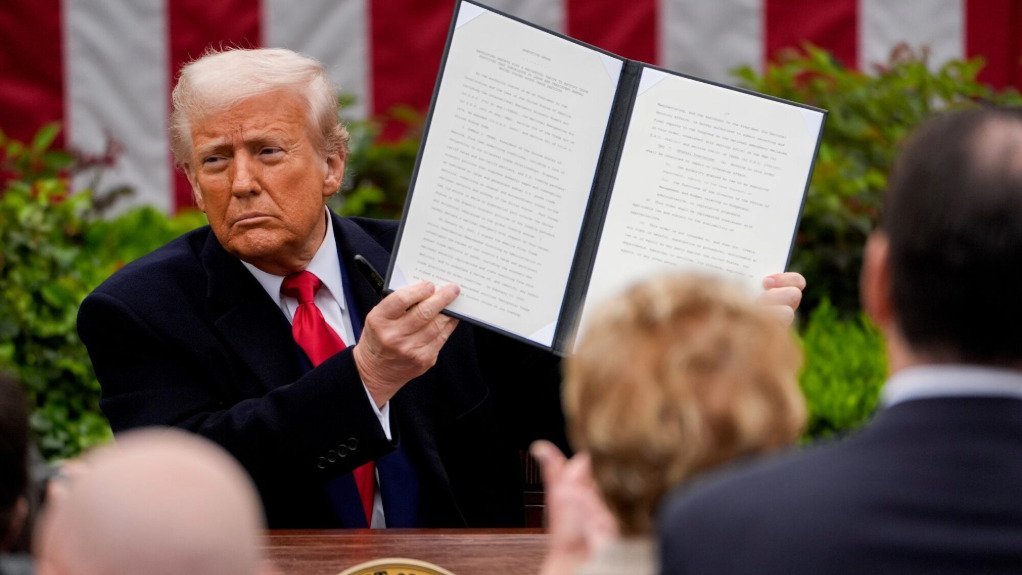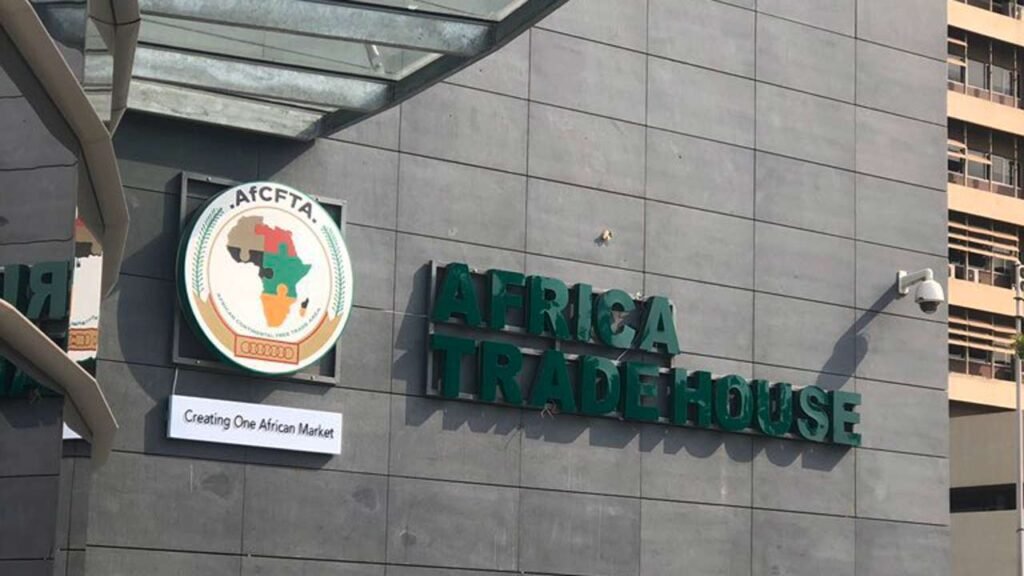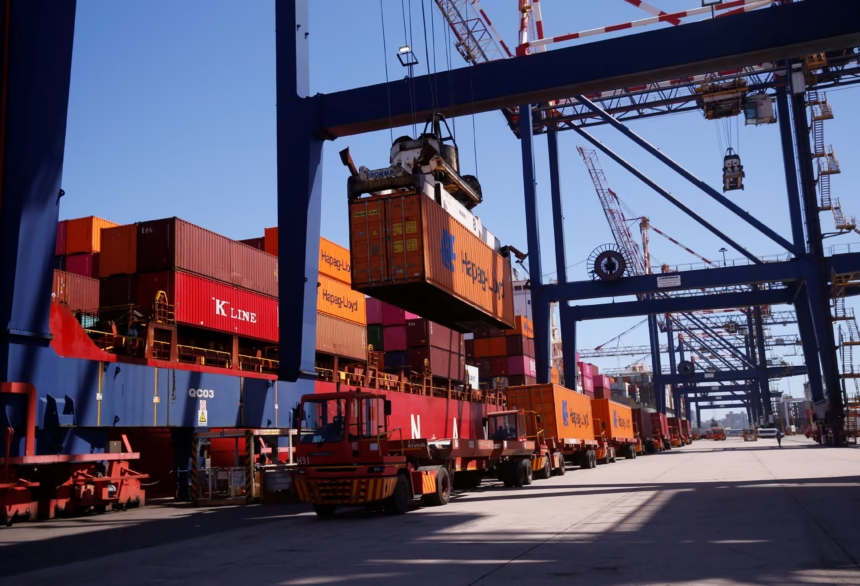When Washington closes doors, Africa must open new trade corridors. The recent wave of US tariffs on African exports has triggered real economic tremors. But behind the disruption lies a powerful opportunity: to rethink trade models, deepen regional integration, and reclaim value on African soil.
We’ve got to accelerate the establishment of our own value chain systems. What we are observing now – the weaponisation of trade policy, investment
Wamkele Mene AfCFTA Secretary-General
policy, nationalism – is unprecedented and it has a very negative impact on
the multilateral trading system.
In 2025, dozens of African countries were hit by sweeping US tariffs, ranging from 10% to as high as 50% on key exports like garments, agro-products, and autos. For economies like Lesotho, Mauritius, Ghana, and South Africa, the shock is real. But it doesn’t have to be fatal. If African leaders choose bold, strategic action, diversifying partners, investing in transformation, and building intra-African supply chains, this moment could mark the end of dependency, and the beginning of true trade sovereignty.
From Shock to Strategy
What Changed – The Tariff Shock
Washington launched a two-pronged trade offensive against Africa in April 2025. On April 2nd, a universal 10% tariff struck 190 countries, followed on April 9th by additional levies of 11% to 50% targeting 57 nations, including 20 African countries.
Lesotho bears the heaviest burden with 50% additional tariffs, while Madagascar faces 47%, Mauritius 40%, Botswana 37%, and Angola 32%. Algeria and South Africa each confront 30% surcharges. These cumulative measures can reach 60% taxation for some African exporters, directly threatening their access to the American market.
Who’s Most Affected – Country Impacts
The US tariff assault has triggered immediate economic carnage across Africa. Lesotho, which exported $237 million to America in 2024, saw its textile sector, representing 20% of GDP and employing 30,000-40,000 workers, collapse instantly. The Tzicc factory’s 1,300 jobs vanished overnight, and despite tariff reductions to 15%, 75% of textile exports remain halted as factories continue closing.
Madagascar’s 180,000-strong textile workforce faces catastrophe under the initial 47% tariff, with 60,000 jobs at risk in a sector comprising roughly 20% of the nation’s GDP. Nigeria, hit with 14% tariffs, saw exports plummet by $527 million in July 2025 compared to the previous year.
South Africa, despite only 7.5% of its exports going to the US, confronts a 30% tariff that threatens 35,000-100,000 agricultural jobs. The human cost is staggering: hundreds of thousands of African workers face unemployment as entire industries buckle under Washington’s trade offensive.
Tariffs Backfire: Massive Costs, Minimal Gains The economic arithmetic of America’s trade war reveals a devastating miscalculation. According to UNCTAD, 28 targeted countries each contribute less than 0.1% to the US trade deficit, meaning these punitive tariffs inflict severe economic damage abroad while delivering virtually no benefits to America. The policy has boomeranged domestically.
US consumers face price increases of 1.7% to 2.3%, translating to $1,900-$3,800 in lost purchasing power per household. Clothing, textiles, and footwear prices have skyrocketed 17-37% within months,
hitting American families where it hurts most.
Washington’s trade offensive has thus achieved a perverse double failure: devastating African economies that pose no meaningful threat to US commerce while simultaneously imposing a punishing tax on American consumers. The tariffs represent economic vandalism disguised as policy, maximum pain for minimal purpose.
Rethinking African Trade: From Export Dependence to Value
Creation
The tariff shock has exposed Africa’s dangerous over-reliance on US markets. Lesotho sent 70% of its textile exports to America in 2024, Mauritius over 40%, leaving entire industries vulnerable to foreign policy whims.

Diversify or Die: Breaking America’s Export Stranglehold The escape routes are clear: Europe’s Economic Partnership Agreements already offer 14 African nations tariff-free access to EU markets. Meanwhile, Africa-China trade hit $282 billion in 2024, quadruple the $64 billion with America. The African Continental Free Trade Area could boost intra-African commerce by 52% by 2030, though it currently languishes at just 16-18% compared to Europe’s 70%.
From Raw Materials to Finished Goods: Capturing Value at Home
Africa’s colonial-era trade model, exporting cheap commodities, importing expensive finished products, is economic suicide. Smart countries are breaking the cycle: Côte d’Ivoire and Ghana, controlling 60% of global cocoa production, are building local processing to capture more of the $100 billion chocolate market. The DRC and Zimbabwe, holding over 70% of world cobalt reserves, could dominate battery supply chains with local refineries. Morocco has already cracked the code in automotive and aerospace manufacturing. McKinsey projects targeted industrialization could generate $1 trillion in annual added value by 2035.
The Relocation Opportunity: Becoming the World’s New Factory Floor
As tariffs reshape global supply chains, multinationals seek “neutral” production hubs. Africa offers young labor (60% under 25), preferential trade deals (AGOA, EPA, AfCFTA), and growing stability in key zones like Morocco, Rwanda, Kenya, and Ghana. But the window is narrow. Without customs reform, port modernization, and regulatory overhaul, this golden opportunity will slip away as quickly as it appeared.
Regional Unity: Africa’s Trade Defense Strategy
AfCFTA: The Continent’s Economic Superweapon
Africa doesn’t lack markets, it lacks connections. The African Continental Free Trade Area unites 54 countries, 1.4 billion consumers, and a combined $3.4 trillion GDP, targeting 90% tariff elimination by 2035.
The numbers expose the missed opportunity: only 16-18% of African trade stays within the continent, versus 38% in Latin America and nearly 70% in Europe. Full AfCFTA implementation could create 18 million sustainable jobs by 2035, lift 33 million from poverty, and generate $450 billion in additional continental income, according to the World Bank.
Infrastructure Over Paperwork: Building Real Trade Corridors
Legal integration means nothing without physical connections. Africa needs transborder transport corridors-linking Lagos-Abidjan, Dar es Salaam-Kigali- Bujumbura, and Maputo-Gaborone. Port modernization in Tema, Mombasa, and Durban must accelerate alongside customs digitalization.
The bureaucratic nightmare persists: goods face 10 documents and 5-day delays at each border. But success stories emerge, the Kenya-Rwanda Single Customs Territory slashed Mombasa-Kigali transit times from 21 to 4 days.
Collective Bargaining Power: Unity Against Trade Bullies Fragmented, African nations remain vulnerable to external pressure. United, they can flip the script. ECOWAS negotiated preferential tariffs with Mercosur, COMESA created regional platforms to counter trade sanctions, and the AU is building an “African Trade Defence Unit.”
According to Tralac, every 1% increase in intra-African trade reduces external dependency by 2-3%. With 1.4 billion consumers and $3.4 trillion in combined GDP, Africa has the scale to negotiate as equals, if it acts as one.
Policy Response: What African Governments Should Do

Don’t Just React – Strategically Reposition
In the wake of the US tariff shock, many African governments scrambled to implement emergency measures. But short-term relief is not enough. The challenge now is to rethink trade strategy at its core, and use this crisis to reposition for the long term.
Successful initial responses:
- South Africa launched a dedicated Export Support Desk for affected sectors like
auto, agriculture and wine. - Lesotho declared its textile sector a “disaster zone”, unlocking emergency aid
and workforce redeployment funds. - Kenya established a $45 million diversification fund to help SMEs explore new
export markets.
Build Domestic Industrial Sovereignty
The message behind US tariffs is clear: countries that rely on low-value exports are dangerously exposed. Industrialisation is no longer just an economic priority, it is an economic security imperative.
National policy shifts needed:
- Modernise Special Economic Zones (SEZs) with clear tax rules, reliable energy, and integrated dry ports.
- Channel credit and PPPs into productive local industries, especially SMEs.
- Prioritise key sectors: agro-processing, technical textiles, mineral, transformation, and electronic components.
Success story:
Morocco’s Industrial Acceleration Plan attracted over $4.2 billion in industrial FDI between 2021 and 2024, creating 180,000+ direct jobs.
Invest in Trade Intelligence and Negotiation Power
Too often, African governments enter trade talks underprepared and data-poor. To protect their economies, they must build a modern, proactive trade governance system.
Key measures:
- Establish a National Tariff & Trade Intelligence Unit to anticipate foreign policy shifts.
- Strengthen economic diplomacy at embassies in Washington, Brussels, Dubai, and Beijing.
- Use AfCFTA and WTO rules to push back against unilateral measures and build alliances.
According to the Overseas Development Institute (ODI), only 11 African countries currently have a strategic trade unit integrated into the presidency or the ministry of finance.
These challenges are not new, but the scale and urgency are. The US tariffs serve as a wake-up call for African governments to rethink old models and respond with bold, coordinated strategies. From cushioning immediate impacts to building long- term trade resilience, this is a chance to shift from reactive policymaking to proactive economic sovereignty.
Turn the Shock Into Sovereign Strategy
The US tariff assault isn’t Africa’s death sentence, it’s a brutal wake-up call. The continent must resist crawling back to dependency once this crisis passes. Instead, this moment demands complete commercial revolution.
The survival formula is clear: resilience equals integration plus industrialization plus diversification. Africa has the raw materials, markets, and demographic dividend. What it needs is political will to execute.
The choice is stark: evolve or remain enslaved to foreign economic whims. Countries that build domestic value chains, strengthen regional ties, and diversify exports will emerge stronger. Those waiting for American tariffs to recede will face the same vulnerability in the next trade war.
Africa cannot control Washington’s tantrums, but it can control its response. The question isn’t whether Africa can afford this transformation, it’s whether it can afford not to make it.






